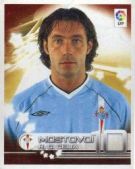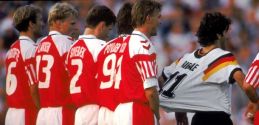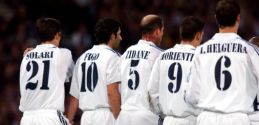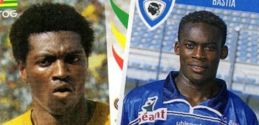
Player Profile: Aleksandr Mostovoi (Александр Владимирович Мостовой)
It was Tuesday 3 November 1998 and it was my first experience of European competition with Aston Villa. The opponents were Celta Vigo in the UEFA Cup and the encounter appeared to be a safe introduction to European competition, having won the first leg 1-0 at the Estadio de Balaídos a fortnight earlier.

Indeed the game did prove to be a one-sided affair, but unfortunately for me it was Celta who dominated proceedings.
My disappointment at seeing Villa stuffed 3-1 on home soil against a team who had only once previously competed in Europe, was tempered though by the fantastic passing display of the opposition and in particular one player. Aleksandr Mostovoi.
The Spanish team featured many talented players, including Michel Salgado, Claude Makalele and Valeri Karpin, but it was Mostovoi who stood out.
The Russian international was seemingly involved in every attacking move and his ability to be a creative menace was so mesmerising that it masked the pain of the home hammering.
He was always available as an outlet for his team-mates; when he had the ball he was comfortable in possession and his exceptional close control and vision meant he was always a threat.
Having spent the previous few seasons watching Villa’s diligently hardworking midfield play - of which I was a great admirer – it was a joy to see first-hand a wonderfully gifted and technical player express how the game can and perhaps even should be played.
Mostovoi’s star shone during his eight years with Celta, but his potential was first spotted in Russia as part of the Spartak Moscow side that won the Soviet league twice in 1987 and ‘89.
He moved to Benfica in 1992 and he was controversially awarded Portuguese citizenship through marriage, enabling his stay in western Europe, but he failed to settle in Lisbon.

Manager Daniel Jeandupeux rescued him from his failed Portuguese experience though and took him to Caen and then Strasbourg the following season, where he once again flourished..
However, his full potential wasn’t realised until he moved to Celta in 1996 for 325 million Pesetas (£1.7m), where he earned the moniker of the ‘Tsar of Balaídos’ thanks to his authoritative performances.
His imperious displays in which he was seemingly the playmaker and finisher of goals helped Celta to the Intertoto Cup in 2000 and a runners-up spot in the Copa del Ray in 2001.
This was scant reward for his talent though and his frustrations became evident upon the departure of compatriot and team-mate Karpin to Real Sociedad, as his flashes of brilliance became more infrequent as his time in Spain drew to a close.
Despite Celta’s sustained presence in the top seven during much of his tenure with the club, he failed to win a major honour that his talent surely deserved and he suffered the indignity of relegation in his final season with the club in 2003/04.
He announced his retirement in 2004 at the age of 35, only to return eight months later for one more game with Alaves, in which he also scored, before hanging up his boots as Celta’s fifth highest ever goalscorer with 55.

His international career would also fail to offer any shiny reward for his talent and ended in ignominy when his temper got the better of him and was sent home from Russia’s Euro 2004 squad, after questioning Russia’s chances of progression under coach Georgi Yartsev.
“The unethical comments made by Aleksandr Mostovoi about Russia’s chances of qualifying mean he cannot stay with the team anymore” Yartsev said at the time.
He did however play a significant part in the ‘94 World Cup and Euro ’96, scoring against Czech Republic in the group stage at Anfield, but he could never help his country past this point.
His international career though mirrored the political difficulties his country was experiencing following the fall of the fall of the Soviet Union and this came to a head on 17 November 1993.
Having already qualified for USA ’94, Russia lost to Greece in their final Group 5 game, prompting an impromptu changing room visit from Football Federation president Vyacheslav Koloskov, who reportedly bellowed that the players didn’t deserve the trip across the Atlantic after a performance like that.
Captain Igor Shalimov reacted to the outburst and began to express his own dissatisfaction with the conditions provided to the national side and also questioned the leadership of manager Pavely Sadyrin.

In a bold attempt to change the quickly outdated Soviet-style running of the team, 14 players signed a letter (left) addressed to the President of National Sports Foundation, Shamil Tarpishev, demanding the appointment of Anatoliy Byshovets as national team manager and an overall improvement in the organisation of the national setup.
Those players were Yuri Nikiforov, Sergey Yuran, Shalimov, Igor Dobrovolski, Igor Kolyvanov, Viktor Onopko, Dmitry Khlestov, Sergey Kiryakov, Mostovoi, Oleg Salenko, Vasiliy Kulkov, Karpin, Andrey Ivanov and Andrey Kanchelskis.

On Christmas Day 1993, these players held a press-conference (Mostovoi pictured far left, with Shalimov and Yuran) and declared their intention to abstain from future games for the national team, unless their demands were met.
It was in vain though, as officials were unmoved, Sadyrin remained and Yuran, Ivanov, Onopko, Nikiforov, Khlestov, Salenko, Karpin and Mostovoi all embarrassedly retracted their statements.
However, Shalimov, Dobrovolski, Kolyvanov, Kiryakov, Kulkov and Kanchelskis refused and as a consequence were excluded from the upcoming World Cup, much to the detriment of the national team.
In 2002, Mostovoi told the BBC: “Several leading players refused to play under Pavel Sadyrin. I was one of them but later changed my mind and went [to the World Cup].
“But we lost [six] players and all of them were excellent”.
His only international honour came in the 1990 Under-21 European Championships when the Soviet Union won the battle of the soon-to-be former states against Yugoslavia, with a 7-3 victory over two legs.
In the absence of silverware, he and his appreciative fans are left to marvel at footage of the autocrat gleefully toying with the opposition, showing just what a special talent he was. First against Aston Villa on that auspicious November night and second in a montage accompanied by an odd Spanish sing-a-long version of Johnny Cash’s song, Hurt.
Tags: , , , Aleksandr Mostovoi , Aston VillaShare this article
Leave a comment
- When did co-commentary become such a serious and miserable business?
- Why do we devote so much time to sharing our love of football for free?
- Villa’s Tokyo downfall: The apparent formality of a world title match
- Son Heung-min and the forgotten wonder goals
- Guess the Premier League goalscorer from the GIF
- A fateful flight
- Goodbye to the instant analogue gratification of Ceefax
- Player Profile: Steve Ogrizovic
- Rejecting FA Cup money in favour of a car boot sale
- It’s a man’s world? Former Arsenal manager crosses the gender divide











